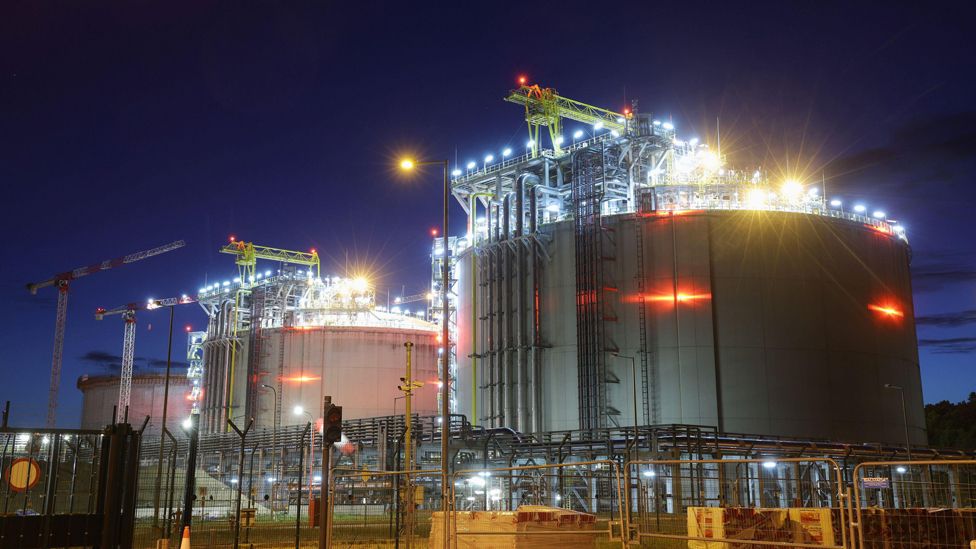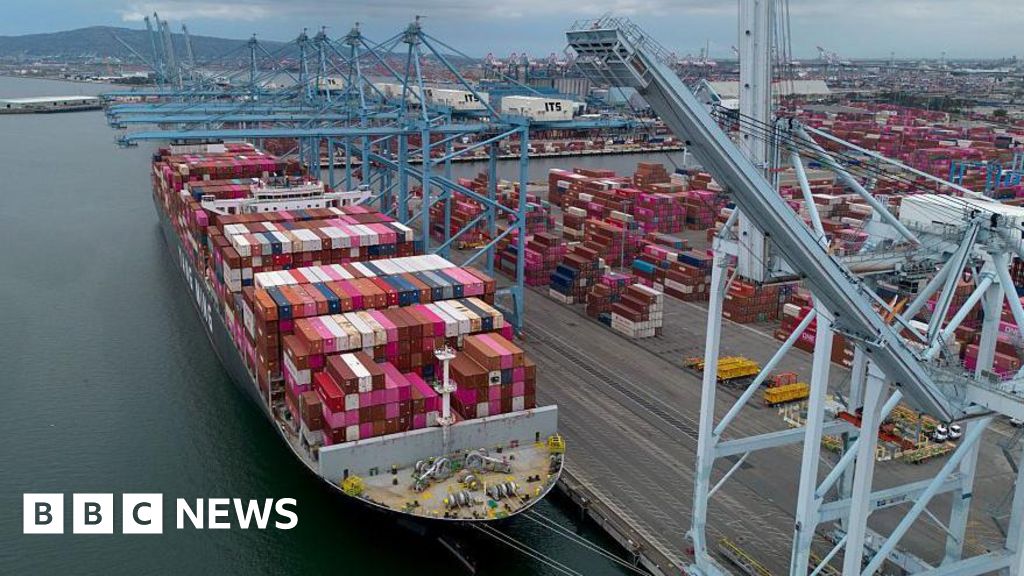ARTICLE AD BOX
By Jo Harper
Business reporter, Warsaw
 Image source, REUTERS / Alamy
Image source, REUTERS / Alamy
The giant cylinders at Swinoujscie liquefied natural gas terminal run by Poland's state-owned gas transmission company Gaz-System
"This has put us in the firing-line," says Józef, a 60-year old taxi driver from the Warszów area of Świnoujście,
His coastal town is home to Poland's biggest liquefied natural gas (LNG) terminal - which some bill as the country's best shot at energy independence.
Although locals like Józef fear this may make it a target for Russia's unpredictable president, Vladimir Putin.
Up until this year Russia was supplying 40% of the European Union's natural gas, but after the bloody invasion of Ukraine in February everyone in this part of Europe is nervous about supplies from Russia.
The threat is hard to imagine, as we wind along narrow roads through a pine forest that runs along the beach. Shafts of sunlight glint on industrial machinery parked along the way to the terminal.
But Poland is banking heavily on this sleepy, northwestern Baltic port to bail it out of a catastrophic energy fix.
The Lech Kaczyński terminal is integral to replacing lost Russian gas, after Gazprom halted supplies to Poland in April.
European gas prices have soared in June. Germany has moved one step closer to rationing gas for consumers and Italy joined a host of European countries reporting further cuts in Russian supplies.
Building capacity across central Europe
Meanwhile, back at the Kaczyński terminal workers are busy laying foundations for a concrete shaft to link a third cylinder to unloading berths about half a kilometre away at the coast.
LNG arrives at the berths on tankers from all over the world - mainly Qatar and the US, but also Norway, and occasionally as far afield as Nigeria or Trinidad and Tobago.
Image source, Alamy
Image caption,LNG transportation vessel Maran Gas Appolonia discharging its cargo
Asked if the project is on track, a Ukrainian worker smiles and cheerily replies, "even more than on track."
Commissioned in 2016, the terminal cost 3.5 billion zlotys to build (£625m). Currently it receives and re-gasifys about 23% of Poland's annual demand of 21 billion cubic meters (bcm) of gas.
On completion of the expansion works, this will increase to 7.5 bcm annually by the end of 2023 and reports suggest it could rise to 10 bcm after that.
Like the rest of Europe, Poland is shifting away from coal-fired power stations but domestic gas consumption is rising fast, likely to about 30 bcm a year, roughly equivalent to heating nine million homes.
The race for LNG
Driving through the terminal site we pass German bunkers from WWII, overgrown with weeds behind a barbed wire fence. "The Germans are building their own terminal over the border, not far from here. But we will beat them to it," says Józef.
Świnoujście is far closer to Berlin than Warsaw - just 56 miles (90 kilometres) from the German capital versus 350 miles (560km) from its Polish counterpart. In northern Germany, a long-planned LNG terminal has also just started construction near Wilhelmshafen, with plans for two others near Hamburg.
As for the boost to the surrounding Polish economy though, the locals are sanguine. Many of the jobs at the LNG terminal are not so far, for local people - with firms employing specialists from other parts of Poland and abroad.
Aleksandra Woźniak, a receptionist at Nowe Millenium, a modern hotel located right next to a site for a new road tunnel, tells me her energy bills are 70% higher than before the war.
"It's crazy, though maybe this terminal will help," she shrugs. Ms Woźniak returned to the area after 17 years living in Devon, where she worked at TK Maxx.
"We came back to Poland to be near our family, but immediately there was Covid, then my mother-in-law died, and now the war." Her husband, a chef, and their four children - all born in Exeter - want to go "home" to the UK, she adds.
"The old Świnoujście is disappearing. It's a building site. Some of the older locals resent the changes - the loss of that small-town feel, the touristy flavour. But it's progress," she smiles.
Shop workers say many of the tourists come over the border from Germany to enjoy local beaches
For now, tourism still seems a healthy money-spinner: the town has a population of about 30,000 people but can get about 300,000 tourists in the summer.
Oskar Janczarek, a sports shop assistant, has never visited the terminal. "For some reason, many tourists come to see it though. And more tourists is good for business."
As his customers arrive, he shifts from English into Polish, and then German without missing a beat. Oskar says energy bills and other prices have rocketed in the last few months and the war has "made us realise even more how fluid borders are."
His colleague, Nadya, a young Ukrainian woman also working in Eurosport agrees, recently arrived from her home town of Lviv in western Ukraine.
Image source, Alamy
Image caption,Tourists at the promenade in Swinoujscie
The scramble to move away from Russian gas
Poland is working on interconnectors with Lithuania, Ukraine, Slovakia and the Czech Republic to be able to deliver surplus gas volumes to neighbouring markets - in a bid to create a regional gas hub.
This is part of a strategy to reorientate the central European gas market, creating north-south gas routes to replace the existing east-west links.
"Poland will have to play a crucial role both in EU efforts to phase out Russian gas imports, and to achieve the longer term goal of zero greenhouse gas emissions," says Henning Gloystein, Director of Energy, Climate, and Resources at the Eurasia Group.
"The immediate priority is to replace the almost 10 bcm of gas Poland used to receive from Russia. That will mostly happen with the start-up of the Baltic Pipe, which is scheduled for start-up later this year," he adds.
"The combination of [this] pipeline and LNG imports improves security of supply. Long-term, Poland will have to do even more in terms of new energy resources as the country must cut back its heavy reliance on coal … if it is to have any chance of achieving its net zero 2050 goals," says Gloystein.
Slovakia - which is almost totally dependent on Russian gas - and the Czech Republic - have pledged support for the terminal. The latter's government has even said it will invest in the expansion of the gas terminal in Świnoujście.
Meanwhile, US company LNGE has reportedly offered to finance construction of a new gas interconnector between Poland and Ukraine.
Image source, MICHAEL STRAVATO
Image caption,Anna Milkulska says Poland's position looks stronger as it will also have the Balticpipe gas pipeline and a planned floating terminal in the Bay of Gdansk
"Germany bet on Russian gas and now needs to scramble to be able to supply enough gas to its own market today and in the future, not really knowing whether it can/should count on Russian gas. Its energy policy with goals of coal and nuclear exit will require more gas in the coming years to enter the market," says Anna Mikulska from Center for Energy Studies at Rice University's Baker Institute for Public Policy who thinks these shifts will change Poland's status in Central Europe.
"Germany's potential plans of being a gas hub to Central and East Europe are not realistic anymore," she adds. "Poland's, on the other hand, are well on the way, with the prospect that it may need to help its neighbours to the west, Germany or even further on".
Image source, Alamy
Image caption,The terminal is named in memory of former president, Lech Kaczyński, who died in a plane crash in Russia in 2010
Too little, too late?
In March, the Polish government provided a further 3 billion zlotys (£540 million) to the Świnoujście terminal's operator.
And although the terminal has become part of the EU's 2022 list of Projects of Common Interest, indicating the bloc's commitment to support the project, not everyone is convinced.
Talk of Poland becoming a gas hub for the region are overblown, according to Albrecht Rothacher, author of a book called 'Putonomics,' and a German former EU diplomat.
"The supplies from Swinemünde (Świnoujście) would be just a drop in the bucket," he says. "I am afraid, in spite of good intentions, unfortunately, [it] is too little, too late."

 2 years ago
34
2 years ago
34








 English (US) ·
English (US) ·